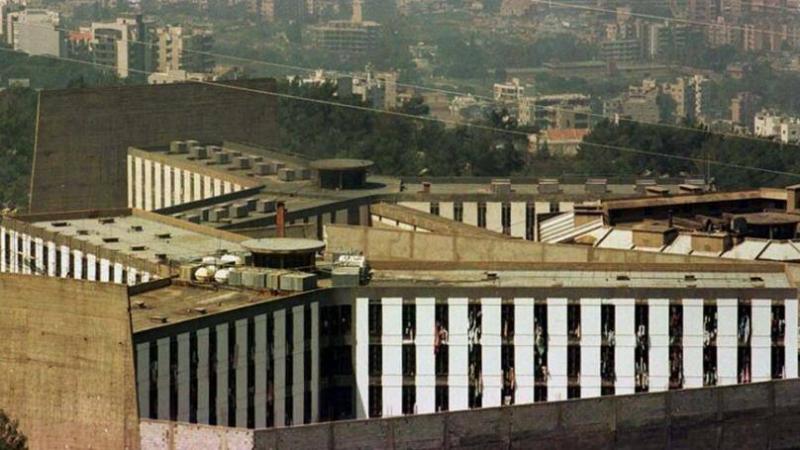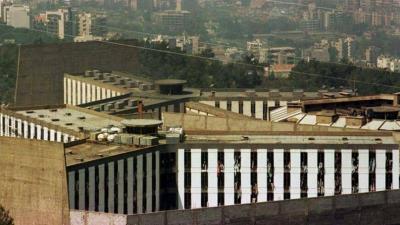What is happening inside Roumieh Prison? Why did the death of three prisoners, all under 30 years old, provoke the prison's security chief? What is the current health situation, and is there talk of a new virus spreading in the prison? These questions arise alongside concerns about the reasons and the outcome—all pointing to the same issue: prisoners dying under mysterious circumstances. Reports indicate that there have been three deaths in the overcrowded central prison of Roumieh, where conditions are described as deplorable, with some claiming the death toll has reached five in less than two months.
According to security sources, one of the deceased prisoners had been in Life Hospital for a month due to health issues, while another died suddenly in his cell from cardiac arrest. The prison administration has requested a tally of the deaths that occurred during the past two years to investigate the causes and does not rule out drug use or overdoses as potential reasons for these deaths, along with the difficult conditions prisoners face due to food shortages and inadequate healthcare.
Security sources confirmed to "Al-Markazia" that confusion has overtaken Roumieh Prison following the deaths of three prisoners aged between 22 and 30. It was revealed that the prison administration has begun investigating several personnel responsible for bringing food to inmates. While denying rumors that the deaths could result from drinking contaminated water or a virus, it was noted that the cases occurred in different buildings, which diminishes the likelihood of poisoning or virus-related deaths.
The second, and more plausible, possibility is that the deceased prisoners suffered from drug overdoses or issues related to the drugs they consumed. Regarding how banned substances reached the inmates, especially since the ban on allowing families to bring food remains in effect, sources disclosed to "Al-Markazia" that this process is facilitated by certain security personnel. Recently, one security staff member was caught on camera smuggling drugs into the prison.
Sources added, "There are prohibited items among the prisoners, especially drugs, and there are now difficulties in searching and seizing these items, which requires a suitable opportunity to avoid triggering a rebellion and chaos that are difficult to control." Yet, this possibility remains the most likely, particularly considering the ages of the prisoners who died under mysterious circumstances. If they were older, the likelihood of them suffering a heart attack would be more plausible. Nonetheless, sources concluded that the prison administration would prefer to conduct autopsies to uncover the true causes of death.
Authorities now fear that the prisoners, due to their miserable conditions leading to deaths attributed to a lack of medical care, might use this as an excuse to ignite rebellion, especially since general amnesty remains their priority for years, although it is not a current priority for the state. This reality prompted the government to take the matter seriously, issuing an urgent letter to Interior Minister Bassam Mawlawi to conduct an investigation and medical examination of the prisons where the deaths occurred and where families claim a virus is spreading. The matter has been entrusted to the Ministry of Interior and the prison administration to take urgent measures, verify the alleged incidents, and determine the reasons for the three reported deaths.
Concurrently, the director of the Prisoner Rights Center in Tripoli, attorney Mohamed Sablooh, affirmed, "The situation inside the prisons is warning of an impending explosion. While prisons are supposed to serve as rehabilitation centers, they have become places for producing criminals." He remarked that someone entering with a bounced check might leave with a certificate of being a drug dealer, addict, or even a criminal due to their resentment towards the state. This situation is compounded by the suffering imposed by the financial crisis and the deterioration of the state on the Internal Security Forces members. "Between the summer of 2021 and the summer of 2022, the Internal Security Forces were tasked with 250,000 court appearances, executing 60% of them while the rest were disrupted due to the pandemic, roadblocks, strikes by judges, mechanical failures, and lack of financial means for repairs."
According to Sablooh, the solution lies in a simple signature from Parliament to approve a law reducing the prison year from nine months to six months, once only, and setting a time limit for life sentences, which would help alleviate overcrowding and reduce public resentment toward the state. Additionally, this would open the door for human rights organizations and relevant ministries to rehabilitate and renovate prisons and build new ones.
In this context, MP Ashraf Rifi has proposed an expedited law to grant exceptional general amnesty for humanitarian reasons following the deaths of two prisoners due to a lack of healthcare, overcrowding, and food shortages, among other reasons. The fear of rebellion is not limited to the prisons but also extends to the families of the prisoners, who have threatened to take to the streets and protest outside the prisons. This began two days ago when families of prisoners in Lebanese jails blocked the international road at the entrance of the town of Brital in protest against "the injustice and suffering endured by the inmates inside their cells."... and more turmoil seems inevitable!




